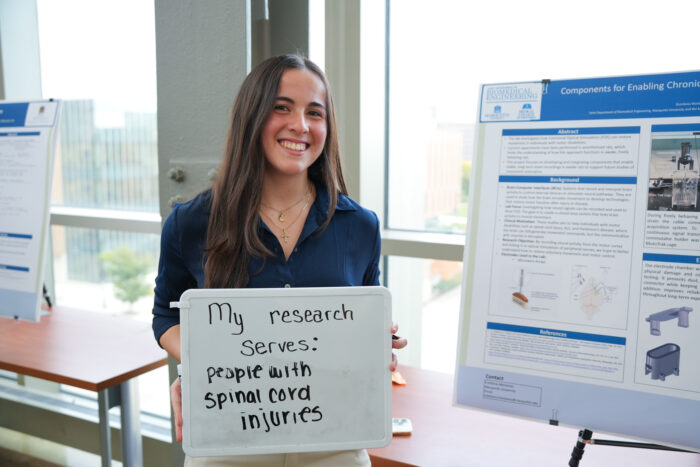Dr. Mary Schneider did not think she would ever want to be anything other than a pediatric nurse until she took Dr. Richard Fehring’s natural family planning class.
“One day after class, Dr. Fehring told me that if I would like to teach natural family planning, there were opportunities available and handed me a brochure,” Schneider recalls. “I held on to the brochure for three years, finished nursing school and told him that I was interested.”
Now Schneider holds Fehring’s former position as director of Marquette’s Institute for Natural Family Planning, which over the summer celebrated its 25th anniversary. The institute is most known for its invention of the Marquette Model of Natural Family Planning, a fertility monitoring regimen for couples who choose not to use contraceptives. More than 500 health care practitioners from around the world, the majority of whom are nurses with a bachelor’s degree, have received institute training and are teaching couples the Marquette Model of NFP.
The Marquette Model involves tracking hormonal levels in urine to determine a woman’s fertility window. Fehring, who is also a former professor and director of research at the College of Nursing, developed it as an alternative to the Creighton Model, which uses cervical mucus indicators. After eight different effectiveness studies and decades of real-world data, the Marquette Model is shown to be over 98 percent effective when used correctly.
“Utilizing our method, couples who are trying to achieve pregnancy do so far more frequently than under the old model,” Fehring says. “We’re probably the most evidence-based natural family planning method in the world today.”
Those who come to the institute for help are usually Catholics or Christians with religious reasons for using natural biomarkers as fertility predictors in lieu of contraceptive methods. However, some patients also use the Marquette Model to monitor their body for irregularities. Sophie Lynch, a senior honors student conducting research with the NFP institute, thinks of the menstrual cycle as a fifth vital sign next to body temperature, pulse rate, respiration rate and blood pressure — one that can be an indicator of overall health if observed in its natural state.
“I wanted to do this research because I was intrigued to learn more about my own body and how I can promote my own health. The more I did that, the more I wanted to help other women better understand their cycles, as well,” Lynch says. “Tracking your cycle can help you with your overall well-being.”
The NFP institute started in 1985, when Fehring and other Marquette nursing faculty worked out of facilities at nearby St. Joseph Hospital. One of the hospital’s leading OB-GYNs asked Fehring if he would consider bringing an NFP program to Marquette. NFP education started that year and the institute followed in 1998.
Since then, the Institute for Natural Family Planning has grown from educating several dozen students per year to more than a hundred. It won an Edge Runner award from the American Academy of Nursing, designating it as an evidence-based, nurse-designed innovative model of care with significant health benefits. The Marquette Model became so widely used that health professionals educated through the institute started a certification agency two years ago to administer an exam for licensed health practitioners who wanted to practice it with couples.
In addition to its algorithms and biomarker measurements, the Marquette Model uses Clearblue fertility monitors to help patients stay up to date with their latest biodata. Clearblue can measure estrogen levels to determine when fertility is at its peak. This provides patients with a clear understanding of when to either have or avoid intercourse, depending on their desired outcome.
“We’re the only ones to have integrated this monitor into our model,” Fehring says. “We are doing studies with other monitors, too, to determine their accuracy for both regular cycles and postpartum cycles. We’re constantly analyzing how useful new tools are for monitoring women’s health.”
Lynch has carved out her own research niche within the institute, studying how certain lifestyle changes can influence the management of Polycystic Ovarian Syndrome, a common hormonal irregularity in women of childbearing age. This research is also being carried out under the umbrella of the Nursing Disciplinary Honors Program. Participating in both the Honors Program and the NFP institute has fostered Lynch’s passion for advancing women’s health, one that she hopes to develop further in graduate school.
“Tracking your cycle and how it changes throughout the month is empowering, and I wish more women understood that, specifically women my age,” Lynch says.
“Doing research for the institute has been such an eye-opening experience. After my first meeting, I was feeling kind of overwhelmed because I didn’t know much of the scientific lingo, but Mary checked in on me and made sure I felt comfortable with it before moving forward. She’s been a great guide in helping me do the research that I want to do.”
All the institute’s research is now also available in textbook form. After years of work, Fehring published “Living with Your Fertility: The Marquette Method of NFP,” a guide to help health care professionals administer the techniques that Fehring spent his entire professional life developing. The book came out just a week prior to the institute’s 25th anniversary summit in July, a fitting capstone to a quarter-century of helping women take control of their futures.
“Working with Dr. Fehring and working at the natural family planning institute is a true gift,” Schneider says. “Being able to work with couples and health care professionals and to see our work grow by leaps and bounds is truly exciting.”



